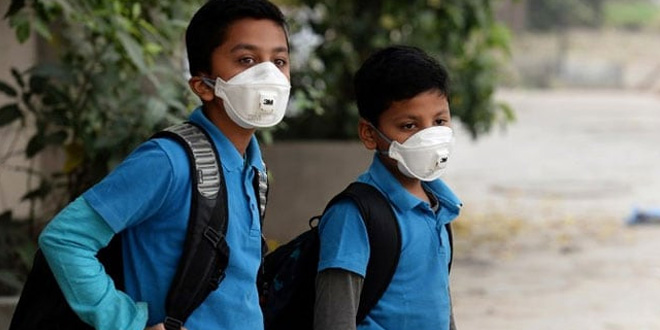Highlights
- Frequently touched surfaces in schools to be cleaned frequently: Centre
- Assemblies and events that can lead to overcrowding will be prohibited
- School administration to ensure contactless attendance: Centre
New Delhi: The Health Ministry on Tuesday issued a standard operating procedure (SOP) for a partial reopening of schools for students of classes 9 to 12 for taking guidance from their teachers on a voluntary basis. The SOP follows Unlock 4 guidelines of Home Ministry which came into effect from September 1. The Home Ministry had said that states and Union Territories may permit up to 50 per cent of teaching and non-teaching staff to be called to the schools at a time for online teaching or tele-counselling and related work from September 21.
Also Read: Coronavirus Explainer: What We Know About Asymptomatic COVID-19 Infections So Far?
It said that students of classes 9 to 12 may be permitted to visit their schools, in areas outside the containment zones only, on a voluntary basis, for taking guidance from their teachers and this will be subject to the written consent of their parents or guardians.
The SOP issued by the Health Ministry said that sharing of items like notebook, pens/pencil, eraser, water bottle amongst students should not be allowed.
He said there should be staggering of guidance activities with separate timing slots to allow for adequate physical distancing and disinfection of classroom premises.
The Health Ministry guidelines said that teachers, employees and students shall observe physical distancing of at least 6 feet wherever feasible all times and there should be frequent handwashing with soap (for at least 40-60 seconds).
Use of face covers or masks will remain made mandatory.
Only schools which are outside the containment zones shall be allowed to open. Students, teachers and employees living in containment zones will not be allowed to attend the school.
Students, teachers and employees shall also be advised not to visit areas falling within containment zones.
Prior to resumption of activities, all work areas intended for teaching or demonstrations including laboratories, other common utility areas shall be sanitised with one per cent sodium hypochlorite solution, with particular attention to frequently touched surfaces.
The ministry said that schools that were used as quarantine centres should be properly sanitised and deep cleaned before partial functioning.
It also asked the school administration to ensure contactless attendance.
Weather permitting, outdoor spaces may be utilised for conducting teacher-student interactions, keeping in view the safety and security of students and physical distancing protocols, the guidelines said.
Assemblies, sports and events that can lead to overcrowding have been strictly prohibited.
The guidelines said that for air-conditioning/ventilation, the guidelines of CPWD shall be followed which emphasizes that the temperature setting of all air conditioning devices should be in the range of 24-30 degree Celcius, relative humidity should be in the range of 40-70 per cent, intake of fresh air should be as much as possible and cross ventilation should be adequate.
Also Read: Presence Of Antibodies May Not Guarantee Protection From COVID-19, Say Scientists
Lockers of students will remain in use, as long as physical distancing and regular disinfection is maintained. Swimming Pool shall remain closed.
Students from Class 9th to 12th will have the option of attending the classes remotely/virtually or physically only on a voluntary basis for guidance from their teachers subject to written permission of parent/guardian.
The guidelines said that cleaning and regular disinfection (using 1 per cent sodium hypochlorite) of frequently touched surfaces (doorknobs, elevator buttons, handrails, chairs, benches, washroom fixtures, etc.) will be made mandatory in all classrooms, laboratories, lockers, parking areas, other common areas before the beginning of classes and at the end of the day.
India’s COVID-19 tally crossed 42-lakh mark after 75,809 new cases were reported, according to the Ministry of Health and Family Welfare (MOHFW) on Tuesday.
As many as 1,133 deaths were reported during the 24 hours.
The total case tally stands at 42,80,423 including 8,83,697 active cases, 33,23,951 cured/discharged/migrated and 72,775 deaths.
Also Read: Complaints From States That People Becoming Lax In Taking COVID-19 Precautions: Health Ministry
(Except for the headline, this story has not been edited by NDTV staff and is published from a syndicated feed.)
NDTV – Dettol Banega Swasth India campaign is an extension of the five-year-old Banega Swachh India initiative helmed by Campaign Ambassador Amitabh Bachchan. It aims to spread awareness about critical health issues facing the country. In wake of the current COVID-19 pandemic, the need for WASH (Water, Sanitation and Hygiene) is reaffirmed as handwashing is one of the ways to prevent Coronavirus infection and other diseases. The campaign highlights the importance of nutrition and healthcare for women and children to prevent maternal and child mortality, fight malnutrition, stunting, wasting, anaemia and disease prevention through vaccines. Importance of programmes like Public Distribution System (PDS), Mid-day Meal Scheme, POSHAN Abhiyan and the role of Aganwadis and ASHA workers are also covered. Only a Swachh or clean India where toilets are used and open defecation free (ODF) status achieved as part of the Swachh Bharat Abhiyan launched by Prime Minister Narendra Modi in 2014, can eradicate diseases like diahorrea and become a Swasth or healthy India. The campaign will continue to cover issues like air pollution, waste management, plastic ban, manual scavenging and sanitation workers and menstrual hygiene.
[corona_data_new]



















